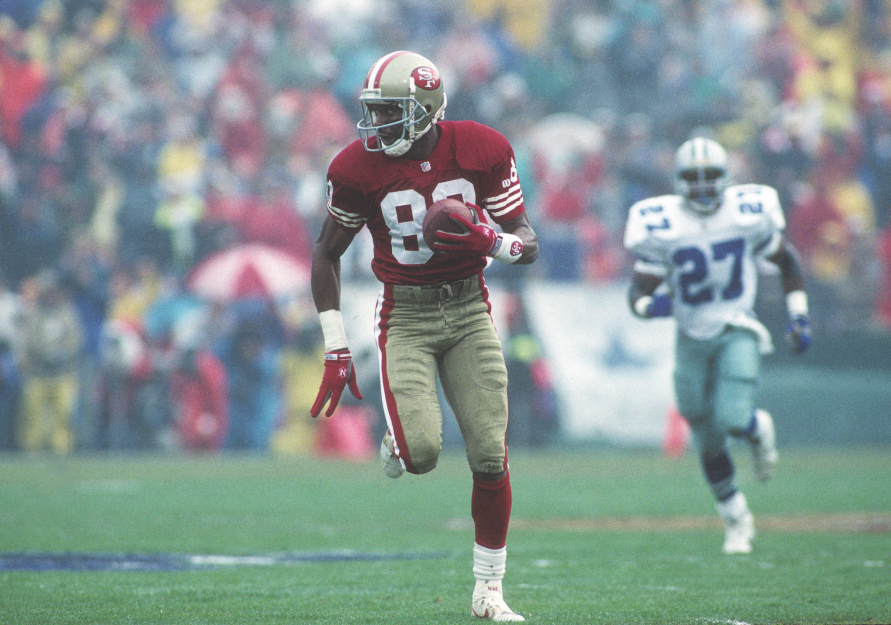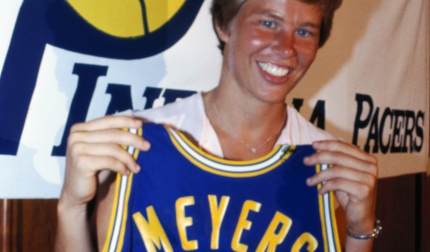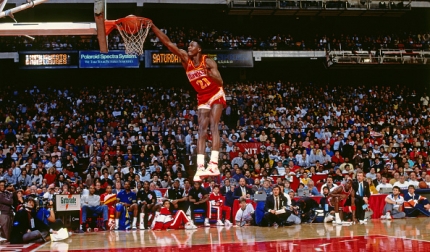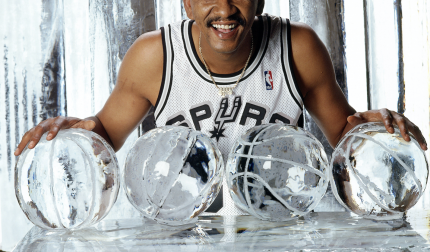How small is Crawford, Mississippi, the town where you grew up?
Crawford is so small that if you blink, you’re going to miss it! (laughs) It’s got a population of about 2,000 people. It’s a very nice place with good people—country people. In Mississippi, it’s all about the hospitality. I had a great time growing up there.
Is that also where you developed your work ethic?
Definitely. My father was a bricklayer. He would take me to work with him in the summer. That taught me the meaning of hard work and dedication. We would go to work at around six in the morning, we would work all day, and then come back home around five p.m. Then he would drop me off at B.L. Moor High School for football practice. I applied that hard work to football. If it’s something that you love doing, put your heart in it.
Did you and your brother once make a pact that one of you would become a pro athlete and buy your parents a house?
Yes! My brother played at Jackson State University. We’d talk about making life better for our family. My brother said, “If I don’t make it, you’ve gotta make it.” So I told my brother, “You’d better make it!” (laughs) I wasn’t going to be a sure thing to make it. Fortunately, I did. One of the greatest thrills of my life was bringing my parents to the Super Bowl and having them experience it.
Was pro sports a part of your childhood in Mississippi?
I was a fan of the Dallas Cowboys! I remember Roger Staubach, Tony Hill, Drew Pearson, all of those guys! Watching them play, I would think about how great it would be to play in the NFL. For Christmas, all I ever wanted was a football. I would go out and kick that football, throw that football. But every year, if I got a football, I was happy.
What was your draft day experience like?
I spent draft day with my brother in his tiny apartment in Jackson, Mississippi. We sat in the living room and watched the draft. I didn’t invite people over, because you never know how the draft is going to go. I was hoping that I was going to go to the Dallas Cowboys. They had the 16th pick. I thought, “This will be great! I’ll go to the team that I idolized growing up.” When I got the word that San Francisco had traded to the 15th spot, I was surprised. I started to think about all the great 49ers players: Joe Montana, Roger Craig, Ronnie Lott, Fred Dean, Dwight Clark, Freddie Solomon, the list goes on an on! And they had just won the Super Bowl! So where was I going to fit in with this team? (laughs) But it all worked out for the best. I played in one of the greatest organizations, for the greatest owners, and the genius Bill Walsh who gave me the opportunity. It was unbelievable.
How difficult was the adjustment going to San Francisco?
It was very hard. It was so difficult, that I lost a lot of confidence and started dropping footballs. That was something that I had never had a problem with before. Being away from Mississippi, going to this big city, all of these expectations that were being put on me, I felt like there was a big weight on my shoulders. I thought that if I had success in the NFL, then other players in the Southwestern Athletic Conference would also get recognized, and they could get drafted. So I felt that I really had to prove myself. So when I came in, I forgot what I did best, which was to catch the football. All through the preseason and during the first regular season game, I really struggled. The second game of the season against the Rams was the first time that I relaxed and was able to blossom.
Were there any players that took you under their wing?
The tradition with the 49ers was that the veterans would take the younger guys and show them how to be a professional. I watched guys like Freddie Solomon, Dwight Clark, Joe Montana. These guys, even with the success they had over the years, still worked hard. Joe Montana was already on his way to the Hall of Fame, but he came to work every day! He was so precise about what he wanted to do, and when you have great examples like that, you want to emulate those guys. That’s why we had so much success through the 1980s, because we had those veteran guys who would show the younger guys how to prepare the right way and be a professional on and off the field.
The Birmingham Stallions of the USFL had you well scouted and made you the first overall pick in the USFL draft. Was that ever a consideration?
Yes! But I had always wanted to play in the NFL. It was questionable, because playing at a small, predominantly black school, I didn’t even know if they would draft me into the NFL. Bill Walsh was somewhere in a hotel watching highlights on a Saturday night, and he noticed me running across the television, running away from people, catching balls. So it was him, by accident, flipping the channels, that got me drafted to the San Francisco 49ers. The Blue and Gray game in Alabama put me on the map. I think I was the MVP in that game, I got to compete against other players from major schools and I made it a point, if I went against someone from Notre Dame, USC, LSU, any big school, I wanted to win. I wanted to show that this kid from Mississippi Valley State University could compete with any of them.
And you competed in the NFL until you were 42. Even at age 40, you were an All-Pro with the Oakland Raiders. What was the most critical part of your longevity?
It was my regimen—the way I trained. I never took any time off. I was probably the best-conditioned athlete in the NFL, and I took pride in it. I wanted to play for a long time and wanted to keep the pedal to the medal. A lot of players get complacent. Once they start to achieve success in the NFL and people start putting them on a pedestal, they slow down. I never gave into that. I always wanted to prove myself, and my conditioning was important. I was going to play you for four quarters. I was going to completely wear you down, so that mentally I was going to exploit you. Even on run plays, I would run the defender off. I would have guys chase me 60 yards down the field on plays that weren’t designed for me. But I think that’s what gave me longevity, because my body was in good shape. I was always able to recover and bounce back.
Part of that fitness regimen was running up an infamous hill.
The infamous hill is about 2.5 miles up. It requires determination, heart, and it’s going to push you. The last 800 meters is straight up! Ricky Watters came to run the hill for the first time, and he thought he was doing pretty well. We wanted to have him at a relaxed pace so he could finish. At the last 800 meters, my trainer said, “OK, Jerry, go!” So I just sprinted up the last 800 meters, and I left him so far behind, he couldn’t believe it. He couldn’t believe I had that kind of pain tolerance. Even though I was tired, I was always able to finish the way I did. That’s the type of conditioning I wanted, because in the fourth quarter, you’re tired but you still have to function at your best. I think that’s why I had success, because I had already challenged my body under those conditions.
Do you think some players think they are fit, but have no idea of their true capacity?
This is how I determine fitness. When you push yourself so hard, there’s nothing else left, and you want to throw up. Mentally, if you continue to do that, you’re going to be in such great shape, you’re going to be able to continue playing in the fourth quarter the way you played in the first quarter. There’s a price of pain that you have to pay. It’s something a lot of guys are not willing to put themselves through. They may be in good shape, but they don’t push themselves to the point where they are ready to throw up, that the pain is so hard that after you finish that last 800 meters you just collapse on the ground. Very few players are willing to take it to a whole different level.
Your leadership on those great teams is sometimes overlooked. Do you have advice for young players who want to become leaders?
I led by example every time I put that uniform on. In 20 years, I was late maybe thirty minutes total? In 20 years! I made sure when I was in that meeting room, I paid attention to every detail. That’s what transcends into what you do on the football field. I think players would look at me and say, “He’s the man. Why is he working so hard.” I just wanted those guys to realize that once you become successful, you don’t relax. If anything, you push harder. I hope they got that from me and were able to feed off of that.
When you retired at age 42, did you have any regrets?
I always felt like I never played that perfect game. There was always something on the film, like “I’ve got to make that block for Roger Craig or Tom Rathman.” I think what made me so hungry is that I was always one of those guys who looked at film and was very critical on myself. When you’re winning football games, I think some players look at the film and don’t pay attention to what’s really happening. But when we were winning, I was still critical of myself because there were always things I felt I could be better at. After 20 years, I had no regrets. I left it all on the field. I did it the right way. I didn’t take any short cuts. I always worked; I think my teammates would attest to that. I always played with a fear of failure.
If no one knew you were Jerry Rice and 42 years old, and you went to tryout for an NFL team, do you think you could have started for a few more years?
To be honest with you, I feel like I could come out of retirement right now. I watch the receivers today, and I respect those guys. But I think I can still run better routes. I still have better hands. I can still explode downfield. My son is with the Montreal Alouettes now. Before he went to Montreal, I was running routes with him. And he said, “Dad, how are you still doing what you’re doing? You’re 53! You shouldn’t be able to do this.” It’s the way I train. But in society, in the NFL, once you get into your thirties, they feel like your career should end. I was able to play into my forties, and I was able to move on from San Francisco, go to Oakland, and go to the Super Bowl again. I was the oldest player to score a touchdown in the Super Bowl with the Raiders.

When Jon Gruden was coaching Tampa Bay, did he have you come work out with Aaron Rodgers before he was drafted?
He did invite me over to work with Aaron. At first, Aaron was all excited and he was overthrowing everything. But then he settled down, and you can see the exceptional quarterback that he is. The arm strength he has, he doesn’t even have to plant his feet. He can still put a lot of velocity on the football. He’s probably one of the best quarterbacks right now.
You are the greatest receiver, and quite possibly the greatest player, of all time. Do current players seek your advice?
It’s different with the Niners because of the new ownership. If Eddie DeBartolo were still in charge, you would still see a lot of the older players around the facility. I still hear from some players, Odell Beckham goes back and forth with me on Twitter. I think there are players who respect how I played the game and had longevity to put up numbers. My main focus this past offseason was to work with my son, so he could show the world what he could do.
You don’t just turn that work ethic off. What do you pour your passion into now?
All the great companies I work with. I do work with Van Heusen. I work with kids to try to prevent childhood obesity. I’ve been on a lot of shows from Hawaii Five-O to Dancing With the Stars. I’m applying the hard work to other things now. Most of the companies I work with want to know about teamwork and how we were able to be so productive and sustain for such a long time with the 49ers. What was the game plan? So we talk a lot about teamwork. You don’t win football games individually.
You hold over 100 NFL records. Which one makes you most proud?
I’m proud that I got the opportunity to play in the NFL with some of the greatest players and for the greatest fans and bring excitement to someone on a given Sunday or Monday. I’m proud that I could make people run alongside their television or jump up and down in their seats. I don’t think about the records. For me, it was more about how I was able to touch people’s lives.
The 50th Super Bowl is in San Francisco. This must be a special moment for you.
It is. I have a book coming out called 50 Years, 50 Moments about the Super Bowl which I’m very excited about. San Francisco is a beautiful place. The game will mean a lot of revenue for the city. And also, I’m really hoping that Eddie DeBartolo will get into the Pro Football Hall of Fame this year for everything that he’s done for football. I think he transcended the game. For us, he made everything more family. You had players willing to take pay cuts to come here to play for San Francisco and for Eddie DeBartolo. So if he gets in this year when they make the announcement in San Francisco, that would be absolutely perfect.





